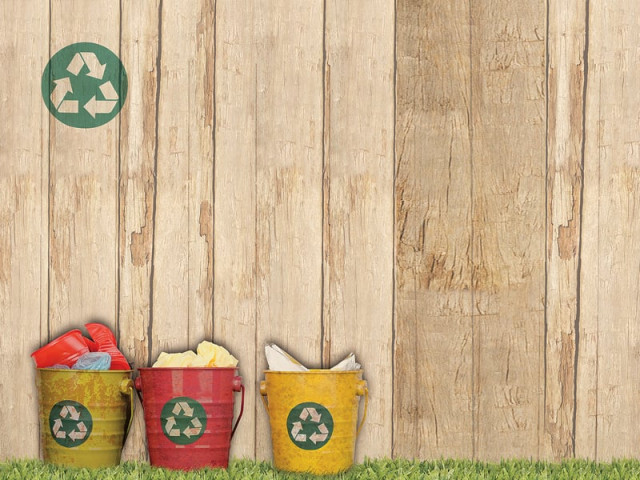Turning trash into cash
The proper collection, disposal and usage can make waste a valuable asset.

The proper collection, disposal and usage can make waste a valuable asset.
The first time I met Gulfam, he ignored me for more than twenty minutes. He was busy scrutinising the heaps of waste, searching for packaging material, paper items and plastic bags; anything that he could turn into quick cash.
He did not give up until he was sure that there was nothing more for him to find. He surveyed the dump one last time as he put his plastic gloves into his side pocket, and then hoisted his collection bag onto his shoulder and started walking.
Nine year old Gulfam is a garbage picker. He visits different areas of Karachi and scavenges in their garbage to collect recyclable items, which he then sells in the flea market near his house. “My brother and I both earn up to Rs250 per day,” he says proudly, “We’re the breadwinners of the family”.
He is not alone; there are thousands of children who earn their livelihood from the garbage we produce daily. Our trash becomes their treasure. The proper collection, disposal and usage can make waste a valuable asset.
“Reduce, reuse, recycle” is the mantra we often hear every time there’s a discussion about recycling. All over the world, the process of recycling has been adopted as a sustainable means of minimising environmental degradation. This is not the case in Pakistan, where the mountain of garbage produced daily is threatening to overwhelm us.
At present, total solid waste generation in Pakistan is about 20.024 million tons a year, which is approximately 59,000 tons per day, according to an environment ministry study. The study also showed that the growth rate of solid waste generation is about 2.4% per annum.

At the rate in which our population is increasing, the amount of waste we produce will double in the next ten years. It is estimated to go up to 4.29 kg per house per day from the present 1.896 kg per house per day, thereby overburdening our already poor waste management methods. Despite the racket made by environmentalists, dumping and burning remain the most common methods of solid waste disposal in this country. The concept of recycling is still in its infancy in Pakistan, with most of the work being done by the legion of waste pickers like Gulfam, one garbage dump at a time.
But now there’s an alternative at the other end of the spectrum, in the shape of companies like Green Earth Recycling. Formed in the early 1990s as a plastic recycling company, Green Earth recycles plastic materials and beverage packages. One of their most recent innovations has been Green Plastic Wood (GPW), which is manufactured by recycling waste to create plastic ‘wood’ from which products like benches, chairs, playground items are made.
“In the beginning, all plastic used to be imported from European countries as there was no local infrastructure for collecting waste plastics,” says Babar Bhatti, Director of Green Earth Recycling. With time, an infrastructure developed that could provide opportunities for locals, allowing them to create a price for the commodity and profit from the collection of these materials.
“The motivation from the very beginning was to set up a system whereby the dumping of waste was minimised and resources were reused in order to reduce the import bill,” says Bhatti. Green Earth now utilises 300 tons per month of waste shopping bags and packaging plastics and 300 tons per month of scrap rubber, including tyres.
“We collect our waste through contractors who are in a position to supply large quantities. However, the initial collection is done by scavengers at the lowest level. These people go door to door on donkey carts collecting household waste in areas where no waste management services exist,” he says, “They then sort through the waste, separating the recyclables from the food waste and take them to small flea markets where they are paid for the materials as per quality and type”.
Bhatti explained that trash is sorted at home in developed countries. As a result, the materials are worth much more and are very easy to recycle. Here, on the other hand, we just throw our trash out all together. He admits that there are a handful of people who separate recyclables and sell them to raddi walas and markets but they are few and far between.
Still, Bhatti is hopeful that in time education will help change the mindsets of people and create awareness about different recyclable waste streams. He believes that change will only come from the new generation. “We do arrange school visits to the premises to show them the process and make them aware of all the things that can be done with everyday items that are discarded,” Bhatti says.
Gulfam and Green Earth Recycling are both, in their own ways, turning trash into cash. If recycling is turned into a business, it will not only boost the economy, but will also generate jobs, conserve our natural resources, save landfill space and energy, and reduce pollution all at the same time. Now that would truly be capitalism with a cause.
Published in The Express Tribune, Sunday Magazine, January 13th, 2013.
Like Express Tribune Magazine on Facebook to stay informed and join the conversation.



















COMMENTS
Comments are moderated and generally will be posted if they are on-topic and not abusive.
For more information, please see our Comments FAQ